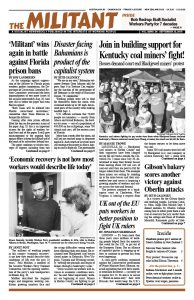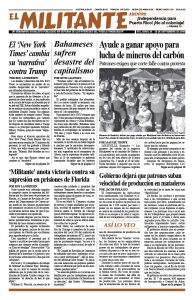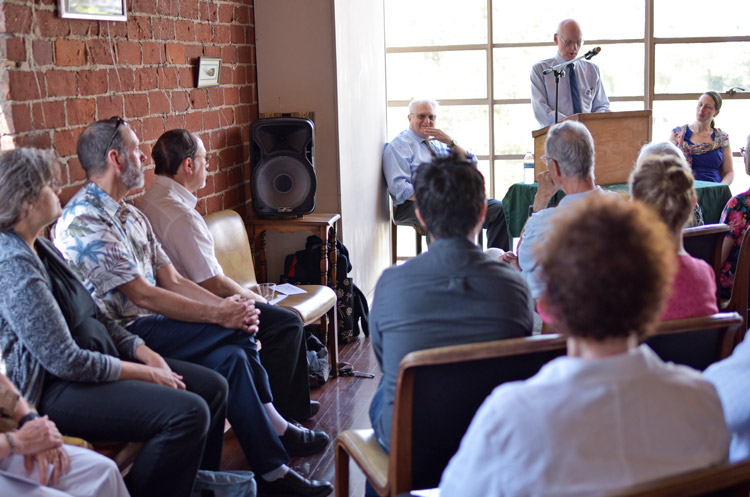LOS ANGELES — Bob Redrup spent “seven decades building the Socialist Workers Party. His was a life lived on the right side of history,” Norton Sandler, a member of the SWP National Committee, told 50 people at a meeting to celebrate Redrup’s life here Sept. 2.
Redrup died Aug. 15 at age 91, after a short illness. Family members from Seattle and some of his neighbors joined party members and supporters at the program, hosted by the SWP.
Redrup joined the Merchant Marine at 16 years of age, transporting war matériel and troops during World War II. He would recount the horror of walking the streets of Yokohama, Japan, after the U.S. military had obliterated the city in a firebombing that killed thousands. Redrup took part in the 17-day national maritime strike in 1946, part of the largest strike wave in U.S. history.
The government responded to the postwar working-class upsurge with a witch hunt, hounding thousands of militant unionists and communists from their jobs. Redrup received a letter from the Coast Guard at the end of 1952 withdrawing his paperwork required to ship out to sea.
By then he had joined the SWP, having met and worked with party members who were also sailors. Members of the party’s fraction in the maritime unions joined fights to strengthen the unions; explained to other sailors that Washington’s wars defended the interests of the capitalist class; and recruited sailors to the communist movement.
Redrup got books written by Leon Trotsky — The Revolution Betrayed, In Defense of Marxism and The Stalin School of Falsification — from SWP members who convinced him of the counterrevolutionary course of the Stalinist leadership in the Soviet Union. As a result, he rejected attempts by members of the Communist Party to recruit him.
“Years prior to the rise of the civil rights movement, Bob and Henry, a Black shipmate, went ashore for drinks in Shreveport, Louisiana, at what turned out to be a whites-only bar,” Sandler told the meeting. “The cops arrested and jailed them. When the skipper came to bail them out Bob refused to leave until Henry was also released and both were reinstated on the ship.”
After the government prevented him from working at sea, Redrup worked on the assembly line at General Motors in Linden, New Jersey, until he was fired for union activity in 1960.
SWP’s turn to industry
Bob and his wife Ann transferred to the Los Angeles SWP branch in 1976. He worked as a factory electrician at Continental Can, organized by the United Steelworkers union.
While there, he was in the party’s USWA fraction during the Steelworkers Fight Back movement, Joel Britton, a member of the SWP from Oakland, told the meeting. Fight Back, led by Chicago-area unionist Ed Sadlowski, demanded union democracy, the right to strike, fought for a union that stood up to the bosses and for the union to take up broader social questions.
This and other union battles and the impact of the fight for Black rights on working people convinced the SWP leadership to organize a turn to industry. Party members got jobs in factories, mines and mills — organizing to mobilize the working class to build fighting trade unions and advance towards socialist revolution. The party membership today has a large majority in retail and industry, advancing the organization of workers against the bosses and their government.
“In 1979, workers took power in Grenada and in Nicaragua,” Britton explained. “These were our revolutions and we did everything we could to defend them in the unions, and strengthen and extend them.” Redrup was part of this work.
Lifelong party builder
When Los Angeles cops were acquitted of the 1991 brutal beating of Rodney King, an anti-police riot followed in which “5,000 buildings were destroyed or damaged,” Britton recounted, “including our headquarters.” The SWP demanded the government charge the cops who beat King.
Redrup and many others reopened another bookstore within days while rebuilding the headquarters, which opened seven months later. He also volunteered on several other construction projects for the party nationally and locally.
“Bob had the proletarian habits of a party cadre,” Rebecca Williamson, from Seattle, told the meeting. She described what she had learned from Redrup about the party’s history when she lived in Los Angeles, and the serious attitude he took about everything he did from punctuality at meetings to party finances. He moved to Seattle to be with his family in the last couple months.
Daniel Garcia, a longshoreman, attended the meeting and said, “I didn’t know him but everything I learned about him today was a tribute to working-class people.” Over $2,900 was contributed at the meeting to continue the work of the SWP.



